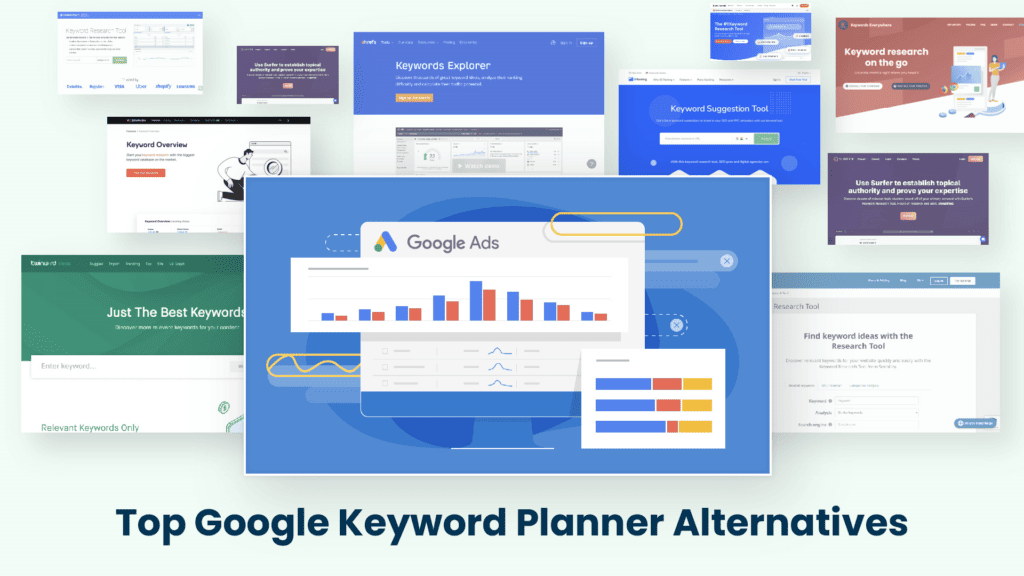
In the ever-growing space of SEO software tools, Google Keyword Planner (GKP) often emerges as a knight in shining armor for many, and it’s easy to see why.
It’s free, backed by the Google brand, and offers a direct line into the database of the world’s biggest search engine.
But while its prominence is unquestionable, it’s also not without its shortcomings.
Relying solely on GKP for your keyword research process could mean missing out on valuable metrics and insights offered by other professional tools.
There are many nuances to a solid keyword research process, such as competitor keyword analysis, keyword difficulty metrics, and more granular search intent categorization, that GKP doesn’t delve deeply into.
If you too are feeling the pinch of GKP’s limitations, this in-depth guide will offer you a hand-picked of 13 Google Keyword Planner alternatives that can boost your keyword research game.
Let us explore further!
Some key limitations of using Google Keyword Planner as your only keyword research tool
Before we dive deep into our list of powerful alternatives, it’s essential to pinpoint some key areas where Google Keyword Planner does not fully meet the needs of all SEO professionals and content creators. By understanding these limitations, you’ll be better equipped to assess which tool (or combination of tools) will best serve your specific requirements.
Focused on Google Ads
Given that GKP is designed for Google Ads, it doesn’t truly offer organic search insights. It focuses on the paid search landscape, which, while valuable, is not always directly translatable to organic search strategies.
Broad keyword volume estimates
Google Keyword Planner often presents keyword volume data in ranges, especially for lower-volume keywords. For example, a keyword might have a volume range of 10-100 monthly searches. While this gives a general sense, the broadness can significantly impede search marketers aiming for precision. This becomes particularly challenging when planning content for niche markets where even slight volume differences can substantially impact strategy.
Absence of an organic keyword difficulty metric
One of the primary metrics that SEO professionals bank on is the keyword difficulty score. This score estimates how challenging it might be to achieve a top-ranking position organically for a specific keyword. It factors in multiple elements, including the authority and quality of sites currently ranking for the term.
Now, it’s essential to note that Google Keyword Planner does provide a “competition” metric with values of Low, Medium, and High. This metric, however, reflects the number of advertisers bidding on a keyword in relation to all keywords across Google Ads. While this can provide insights into paid search competition, it doesn’t offer a clear picture of organic search competitiveness. The “competition” metric in GKP is tied directly to advertising on the Google Ads platform and doesn’t necessarily correlate with the organic keyword difficulty that SEOs typically seek.
Missing user intent breakdown
GKP doesn’t provide keyword search intent categorization like ‘informational,’ ‘transactional,’ or ‘navigational.’ Such insights can be instrumental in tailoring content that fits the exact needs and expectations of searchers. Without this granularity, there’s potential for missed opportunities in aligning content with specific user intents.
Note: Knowing these limitations is not about downplaying the importance of GKP. It’s a vital tool with considerable merits. However, acknowledging its constraints can empower you to complement its data with insights from other tools, thus giving you a more holistic and well-rounded keyword research strategy.
13 Google Keyword Planner alternatives that can supercharge your keyword research workflows
Time to dive into our meticulously curated list of top-tier keyword research tools, each spotlighting unique strengths that challenge Google Keyword Planner’s limitations. With G2 ratings and detailed pricing, you’re armed to make an informed choice.
TL;DR list of 13 Google Keyword Planner alternatives:
- Twinword Ideas
- Ahrefs
- Semrush
- Ubersuggest
- Keyword Tool
- Moz
- KWFinder by Mangools
- Keywords Everywhere
- SE Ranking
- Similarweb
- Serpstat
- Surfer
- Seobility
1. Twinword Ideas
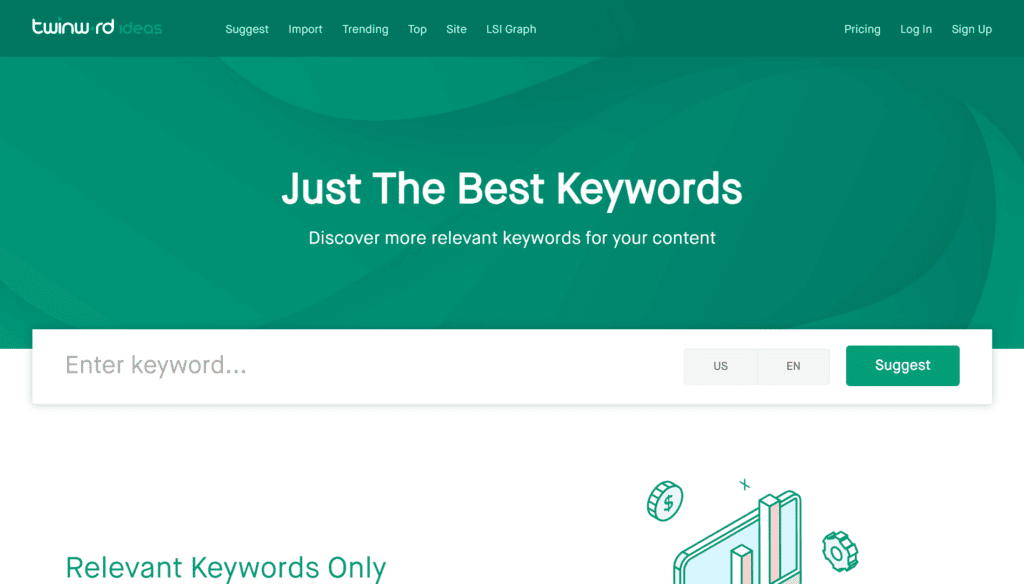
Twinword Ideas keyword research tool landing page banner.
A holistic keyword research tool tailored for SEO professionals and content marketers, Twinword Ideas leverages AI to offer winning keyword suggestions, user intent analysis, automatic keyword grouping and much more.
Key features that give Twinword Ideas an edge over Google Keyword Planner:
- User intent categorization: Where GKP lacks user intent categorization, Twinword Ideas shines with its precise user intent filters that enable users to directly target ‘informational,’ ‘transactional,’ or ‘navigational’ queries.
- Relevancy score: A unique feature that sets Twinword Ideas apart is its relevancy score. This score aids content creators and marketers assess a keyword’s relevance to their niche or topic, ensuring the content resonates with the target audience.
- Trending keywords: Twinword Ideas also helps you find recently emerging keywords on Google News. By reading related news articles, you can discover connections and relationships, giving you an edge in understanding the current trends.
- Automatic keyword grouping: Another standout feature of Twinword Ideas is its AI-powered automatic keyword grouping. Instead of sifting through extensive lists, users receive a curated set of keywords organized by popular topics and user intent.
G2 rating: 4.5/5 (1 rating)
If you don’t have access to Google Keyword Planner, this is a fantastic alternative. It’s a platform that allows you to search for keywords and then filter the results by things like search volume, word count, and relevance score. Here’s the really cool feature, you’re also able to filter by user intent, such as ‘know,’ ‘do,’ ‘buy,’ and ‘local’.”– Elizabeth Bradshaw of Canvas Arts Boutique / Business Owner
Pricing:
- A freemium version is available to try the product without requiring any sign-in. Run a free keyword search now.
- Paid subscription plans start from $12/month when billed annually with an impressive 30,000 keyword suggestions limit per month.
2. Ahrefs
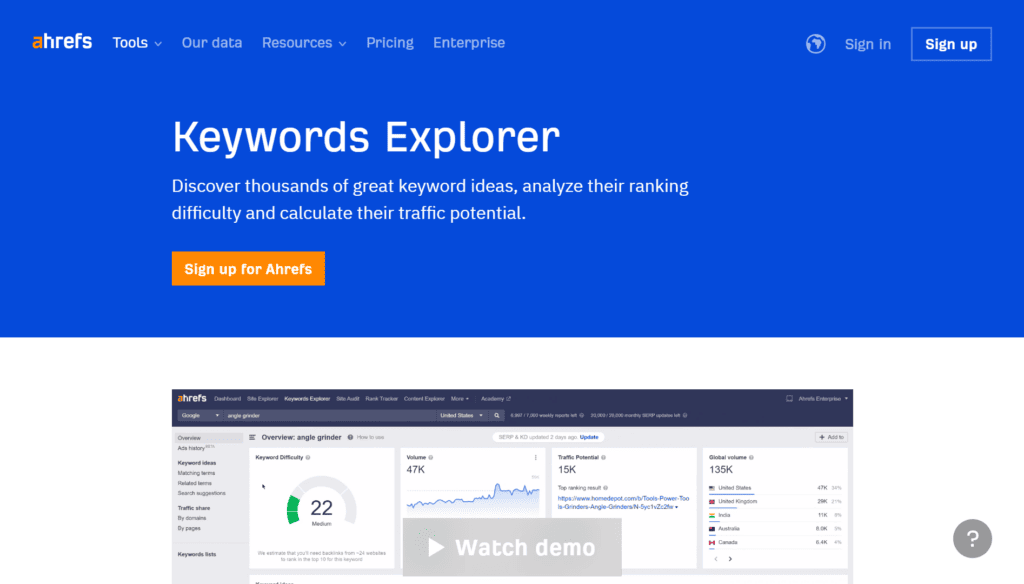
Ahrefs Keyword Explorer tool landing page banner.
Ahrefs is renowned for its comprehensive SEO suite, with Keywords Explorer standing out as one of its prized tools. Backed by an extensive database of over 7 billion keywords, the tool ensures that users are equipped with a thorough understanding of keyword metrics, trends, and SEO insights.
Key features that make Ahrefs stand out against Google Keyword Planner:
- Vast keyword database: Ahrefs boasts more than 7 billion keywords, updated monthly, ensuring a wealth of keyword suggestions and data for users.
- Multi-platform keyword data: Beyond Google, Ahrefs provides keyword data for 10 search engines, including YouTube, Amazon, Bing, and Baidu, leveraging clickstream data for more accurate volume estimations.
G2 rating: 4.6/5 (483 ratings)
Pricing:
- Freemium keyword generator tool is available with limited metrics.
- Paid subscription plans start from $99/ month.
3. Semrush
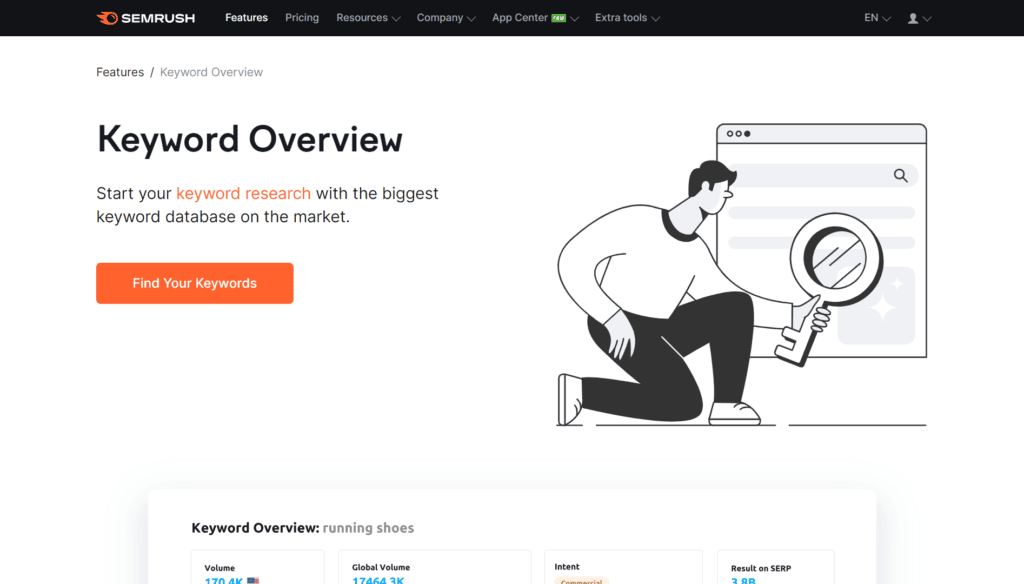
Semrush keyword research tool landing page banner.
Semrush is a widely recognized SEO and digital marketing toolkit that offers many features for keyword research, site audit, competitive analysis, and more. The Keyword Overview tool from Semrush is designed to help users gain in-depth insights into any keyword, helping them effectively strategize their digital marketing efforts.
Key feature that makes Semrush stand out against Google Keyword Planner:
- Spot new SEO opportunities: With Semrush, users can explore their target audience’s queries about a brand, dive into related keywords for ad ideas, and discover low-competition and long-tail keywords effortlessly.
G2 rating: 4.5/5 (1778 ratings)
Pricing:
- Freemium version is available.
- Paid subscription plans start from $108.33/month when billed annually.
4. Ubersuggest
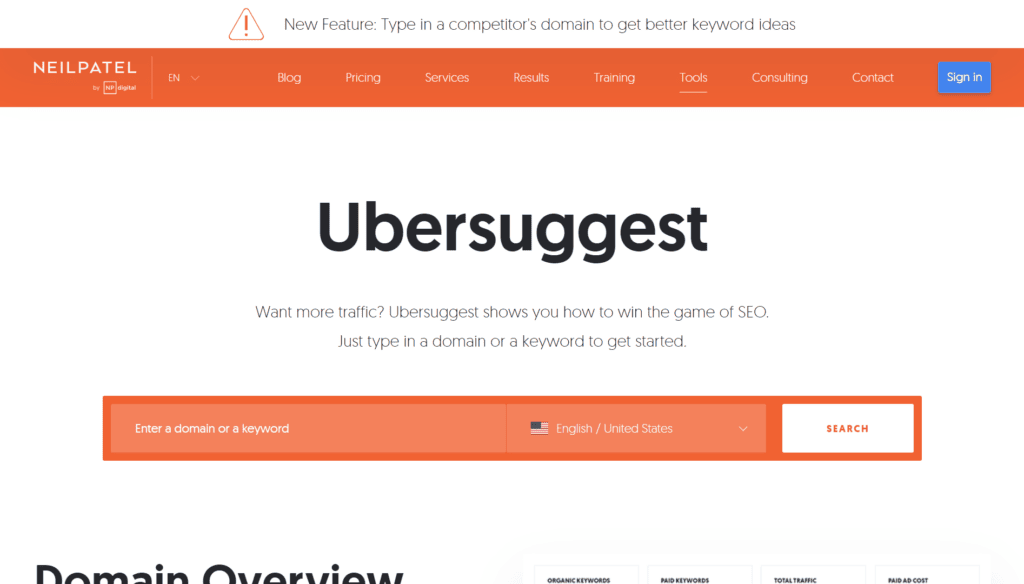
Ubersuggest keyword research tool landing page banner.
Ubersuggest is a versatile SEO tool with a generous free plan, empowering users to conduct comprehensive keyword research, assess competitors, conduct site audits, and more. A brainchild of renowned marketer Neil Patel, Ubersuggest strives to provide valuable insights for marketers to enhance their strategies.
Key feature that makes Ubersuggest stand out compared to Google Keyword Planner:
- Extensive keyword suggestions: Ubersuggest doesn’t just stop at basic keyword recommendations. It offers a broad spectrum of keyword ideas, from primary terms to long-tail variations, equipped with data on volume, competition, and seasonal trends. The tool further simplifies the process by providing keyword suggestions based on what’s working for competitors and prevalent Google searches.
G2 rating: 4.2/5 (113 ratings)
Pricing:
- Free trial available.
- Paid plans start from $12/month.
- One-time purchase options are available from $120.
5. Keyword Tool
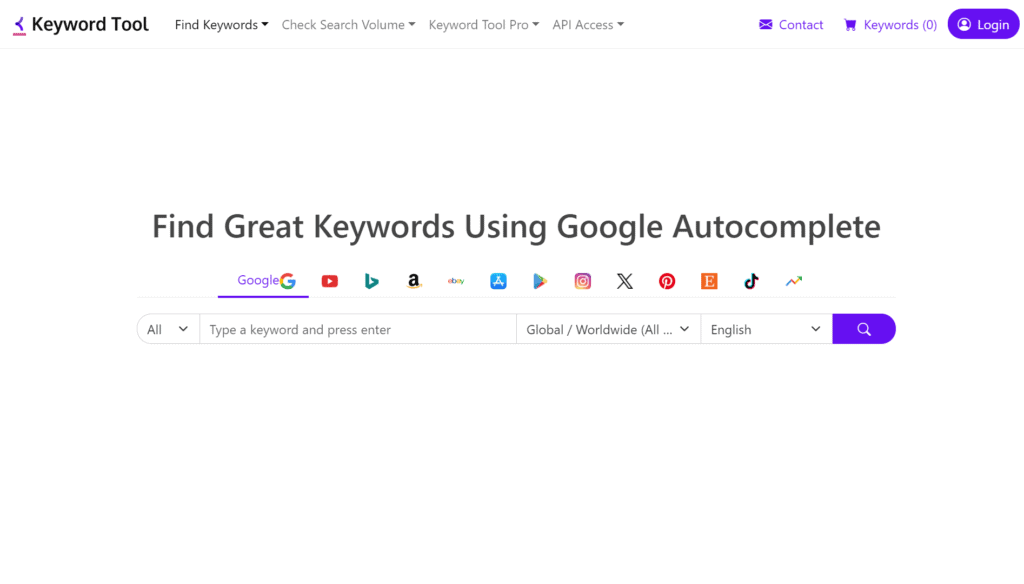
Keyword Tool landing page banner.
Keyword Tool stands as a powerful contender in the keyword research landscape, offering a free alternative to Google Ads Keyword Planner. It’s celebrated for rapidly generating long-tail keywords in real-time, directly tapping into the vast reservoir of Google Autocomplete data.
Key feature that makes Keyword Tool stand out compared to Google Keyword Planner:
- International SEO: Keyword Tool supports 192 Google domains, and 83 Google language interfaces for target audiences in different geographies and languages, ensuring keyword relevancy across different regions and tongues.
G2 rating: 4.4/5 (17 ratings)
Pricing:
- Free trial available.
- Paid subscription plans start from $69/month when billed annually.
6. Moz
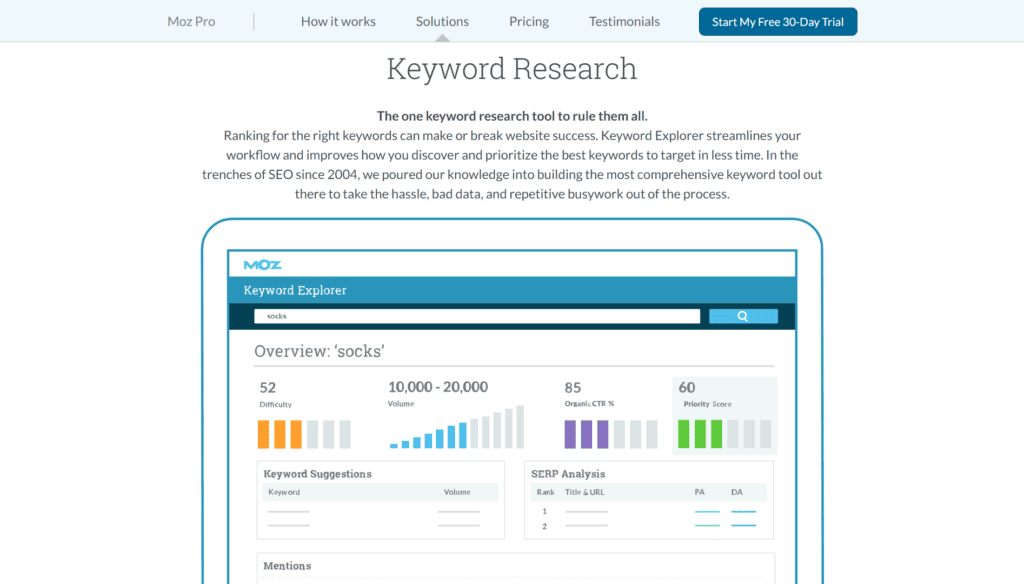
Moz Keyword Explorer landing page banner.
Established as an authority in SEO since 2004, Moz’s Keyword Explorer is an all-in-one tool designed to simplify the intricate process of keyword research. It allows users to pinpoint high-potential keywords, evaluate their competition, and strategize their content precisely within a single interface.
Key feature that makes Moz’s Keyword Explorer stand out compared to Google Keyword Planner:
- Seamless keyword management: With Moz, users can easily create, manage, and categorize keyword lists, enabling them to fine-tune their content and keyword strategies more effectively. This holistic approach eliminates the need for multiple tools, streamlining the entire keyword research process.
G2 rating: 4.4/5 (384 ratings)
Pricing:
- 30-day free trial available.
- Paid subscription plans start from $79/month when billed annually.
7. KWFinder by Mangools
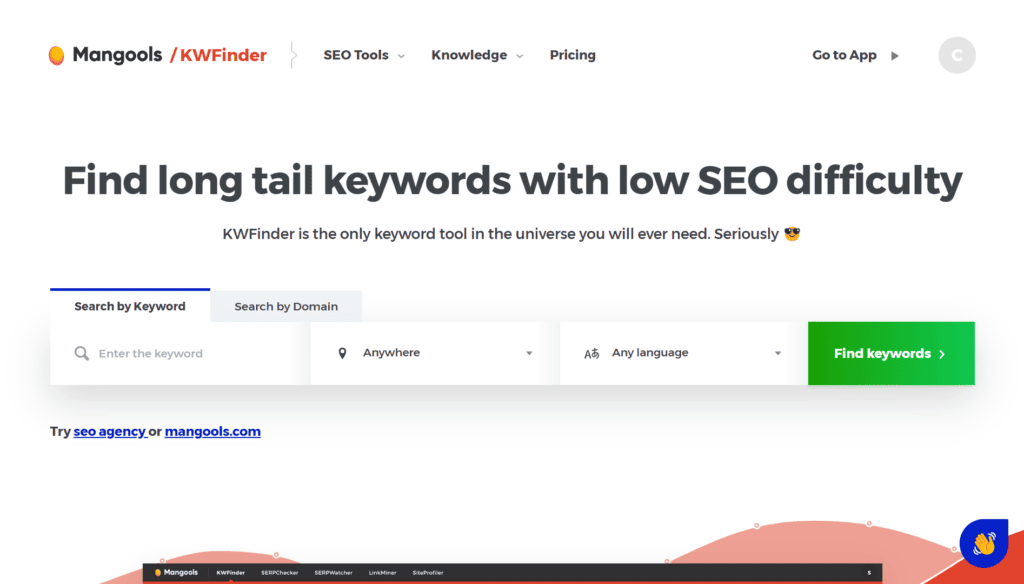
KWFinder tool landing page banner.
KWFinder by Mangools is a trusted keyword research tool known for its simplicity and effectiveness. With a clear motto to make keyword analysis easy for everyone, KWFinder assists users in discovering long-tail keywords with low SEO difficulty.
Key feature that makes KWFinder stand out compared to Google Keyword Planner:
- Competitor keyword analysis: Instead of starting from scratch, KWFinder offers insights into what’s working for the competition. By simply entering a competitor’s domain or URL, users can unearth valuable keywords that competitors rank for, offering an edge and saving hours of manual research.
G2 rating: 4.5/5 (5 ratings)
Pricing:
- Paid subscription plans start from $19.9/month for the basic plan.
8. Keywords Everywhere
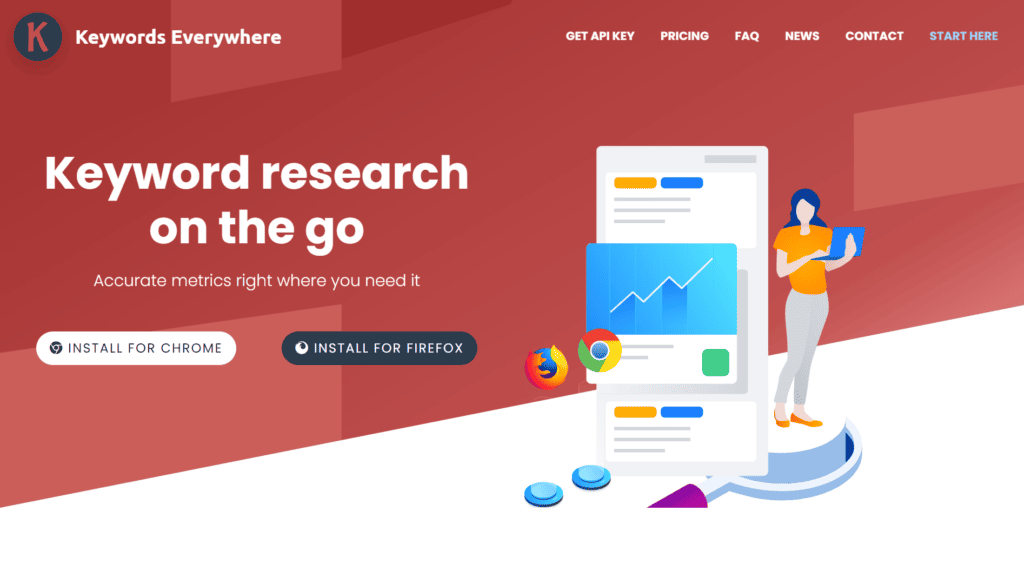
Keywords Everywhere landing page banner.
Keywords Everywhere is more than just a keyword research tool; it’s a versatile browser add-on compatible with Chrome and Firefox. It is convenient, delivering keyword data seamlessly as users browse the web.
Key feature that makes Keywords Everywhere stand out compared to Google Keyword Planner:
- Seamless browser integration: Unlike standalone platforms, Keywords Everywhere integrates directly into your browser. This means real-time search volume, CPC, and competition data are displayed on multiple websites as you browse, streamlining your research process and offering insights without needing external tools.
G2 rating: NA
Pricing:
- Paid subscription plans start from $1.25/month.
9. SE Ranking
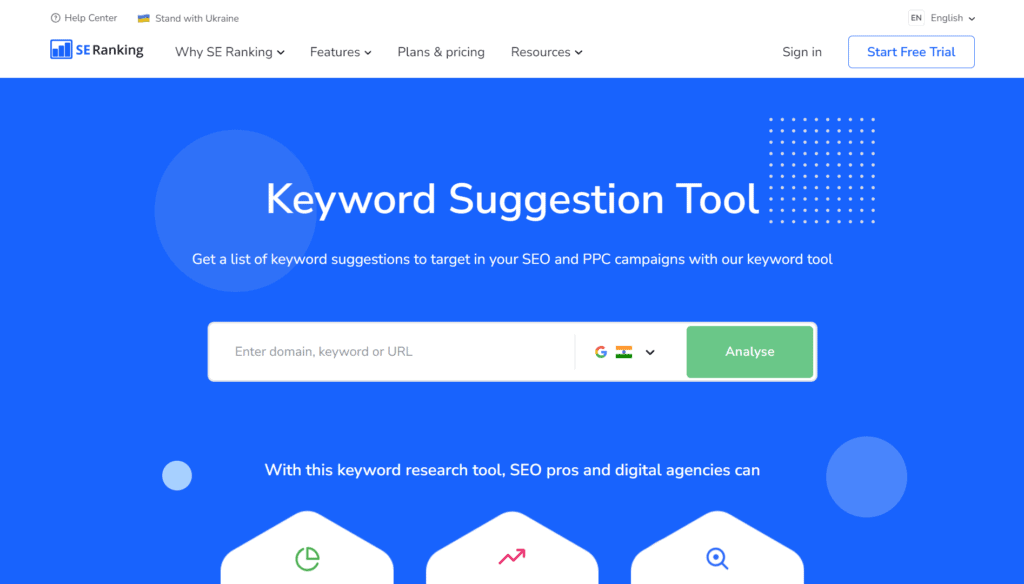
SE Ranking keyword research tool landing page banner.
SE Ranking’s Keyword Suggestion tool is a dynamic solution designed for SEO professionals and digital agencies. It offers thorough keyword analysis, enabling users to discover new opportunities, gauge keyword competition, and gain insights into core keyword metrics.
Key feature that makes SE Ranking’s keyword tool stand out compared to Google Keyword Planner:
- Bulk keyword analysis: SE Ranking stands out with its ability to simultaneously handle vast volumes of keywords. This bulk keyword generator ensures that users can swiftly evaluate groups of search queries and retrieve comprehensive reports in seconds, a crucial feature for large-scale campaigns or those in the initial stages of extensive keyword research.
G2 rating: 4.8/5 (1193 ratings)
Pricing:
- Free trial is available.
- Paid subscription plans start from $44/month when billed annually.
10. Similarweb
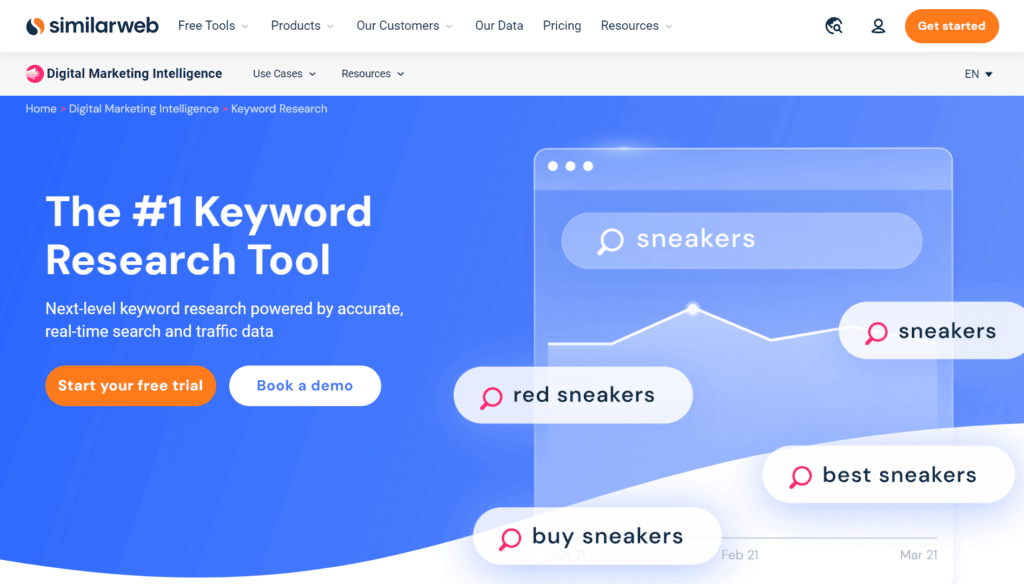
Similarweb keyword research tool landing page banner.
Similarweb offers a unique angle in the world of keyword research tools. Emphasizing real-time search and traffic data, it provides professionals with invaluable insights into SEO and PPC dynamics.
Key feature that makes Similarweb stand out compared to Google Keyword Planner:
- Daily keyword data refresh: A game-changer in the industry, Similarweb is one of the few platforms that updates its keyword data daily. This rapid refresh rate allows users to stay ahead of the curve, seizing trending keywords before competitors can react.
G2 rating: 4.5/5 (788 ratings)
Pricing:
- 7-day free trial available.
- Paid subscription plans start from $125/month when billed annually.
11. Serpstat
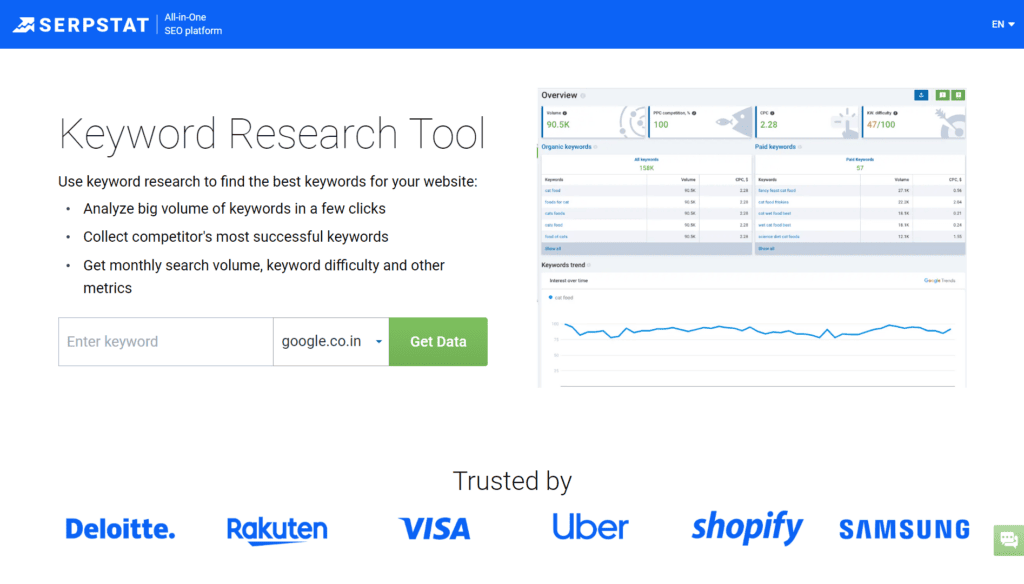
Serpstat keyword research tool landing page banner.
Serpstat is a multifunctional keyword research tool built for businesses aiming to perfect their SEO and PPC campaigns.
Key feature that makes Serpstat stand out compared to Google Keyword Planner:
- Batch analysis: A powerful feature enabling users to compare up to 100,000 keywords in a single report across five databases. With insights into volume, difficulty, cost, PPC competition, and number of results, businesses can fine-tune their keyword strategies to perfection.
G2 rating: 4.6/5 (454 ratings)
Pricing:
- 7-day free trial available.
- Paid subscription plans start from $50/month when billed annually.
12. Surfer

Surfer keyword research tool landing page banner.
Surfer stands at the forefront of modern keyword research, offering a comprehensive tool designed to simplify and amplify content strategies. This SEO suite helps businesses and content creators quickly identify the right topics, optimize their strategies, and produce rankable content that resonates with their audience.
Key feature that makes Surfer’s keyword research tool stand out compared to Google Keyword Planner:
- Swift topic cluster generation: With Surfer, you can uncover dozens of relevant topic clusters based on your primary keyword. This ability to generate many topic ideas in minutes eliminates hours of research, making content planning a breeze.
G2 rating: 4.8/5 (467 ratings)
Pricing:
- Paid subscription plans start from $69/month when billed annually.
13. Seobility
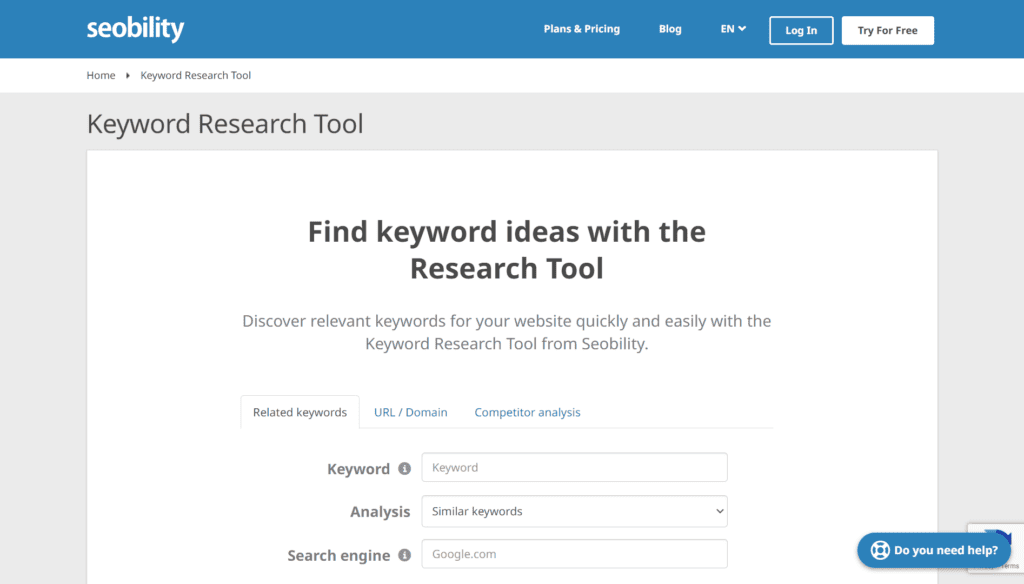
Seobility keyword research tool landing page banner.
Seobility presents a robust suite for keyword research, ensuring businesses and SEO professionals get the most out of their content strategy and website optimization efforts.
Key feature that makes Seobility’s keyword research tool stand out compared to Google Keyword Planner:
- Advanced Filtering Options: Customize your keyword research using a myriad of filter options. Whether you’re after short-tail or long-tail keywords or you wish to include/exclude specific terms, Seobility helps you get the most refined results.
G2 rating: 4.6/5 (181 ratings)
Pricing:
- Freemium version is available.
- Paid subscription plans start from $50/month after a 14-day free trial.
Wrapping up: Time to upgrade from Google Keyword Planner
Our exploration led us through a meticulously curated list of 13 Google Keyword Planner alternatives, each offering distinct features and advantages, from organic insights vast databases, search intent breakdowns, and more.
Armed with this newfound knowledge, the next step is clear.
If you’re serious about elevating your keyword research game, you must diversify your toolkit. And while many great options are available, why not start with a solution tailored specifically for SEO professionals and content marketers?
Twinword Ideas offers you the much-needed edge with features like user intent categorization, relevancy scores, and AI-powered automatic keyword grouping.
Not just an alternative but an upgrade.
Try Twinword Ideas keyword research tool for free now!
Check out other chapters in this series on keyword research:
Chapter 1: Overview Of Keyword Research
Chapter 2: What Is User Intent
Chapter 3: What Are Long-Tail Keywords
Chapter 4: What Is Keyword Difficulty
Chapter 5: Keyword Research Tools



